The Top 7 Wars that would make awesome games
If games ever get tired of recycling the same historical settings, here are a few places we'd like to see them go
6. The Anglo-Zulu War
What it was: It’s tempting to dismiss the 1879 Anglo-Zulu War as just another violent subjugation of a native people by a colonial power, but the English war against South Africa’s Zulu Kingdom was different. Where most “primitives” tended to just get bulldozed by the superior technology and greed of Europe’s colonial powers, the Zulus – an expansionist, imperial power in their own right – had been kicking ass for decades, and they didn’t stop kicking it just because the ass’s owner was packing heat.
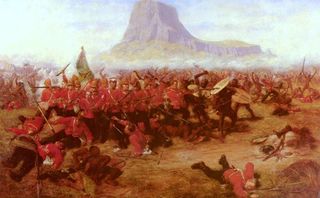
Above: The Battle of Isandlwana, the single greatest Zulu victory of the war
When a relatively small (~7,800 troops) British invasion force advanced into Zululand following a lengthy border dispute, the Zulus reacted immediately, striking back with a militia estimated to have been about 35,000 strong. Armed with little more than spears and shields, and using tactics pioneered by the fearsome (and possibly insane) 18th-century Zulu king Shaka, the Zulus managed to overwhelm and outmaneuver the better-armed (but badly outnumbered and poorly led) British, successfully crushing and repelling the initial British invasion force with a rapid series of victories.
The British had grossly underestimated their opponents, and it wasn’t a mistake they intended to repeat. Gathering a force of better-armed reinforcements, they marched on the Zulu capital of Ulundi, smashing the main Zulu army and razing Ulundi in the process. It was a fairly one-sided end to the war, but the fact that the technologically handicapped Zulus managed to embarrass the biggest imperial power of the 19th century with a string of early victories is impressive.
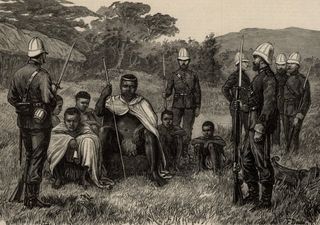
Above: Zulu king Cetshwayo was eventually taken prisoner, but he had a good run
Why it’d make an awesome game: Exploring an asymmetrical conflict like this in the context of the game would be fascinating from either side, whether as a British soldier enduring a terrifying, Left 4 Dead-style siege at Rorke’s Drift (as seen in the movie Zulu), or as a young Zulu sprinting and stabbing his way through lines of invading, red-coated riflemen. Or both, considering that focusing on one side to the exclusion of the other would be bound to raise someone’s hackles, never mind depriving the player of half of what could no doubt be a fascinating story.
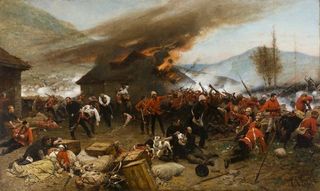
Above: Whoever the focus is on, though, it'd be cool to see Rorke's Drift be part of it
Sign up to the 12DOVE Newsletter
Weekly digests, tales from the communities you love, and more
5. The Boxer Rebellion
What it was: We’ve got kind of a soft spot for doomed rebellions, particularly when it’s difficult to know who to root for. On one side of the Boxer Rebellion (which broke out at the turn of the 20th century) were the downtrodden Chinese and the Righteous Harmonious Fists (called "Boxers" by the Western powers, who didn't know what the hell kung fu was at the time), an army of disenfranchised peasants who painted themselves as badass martial artists capable of the sorts of things generally only seen in Hong Kong’s more ridiculous action movies. And before you think that sounds amazing, consider that they were also responsible for a deadly campaign of violence against Chinese Christians, missionaries and anything or anyone else perceived as foreign or foreign-influenced.
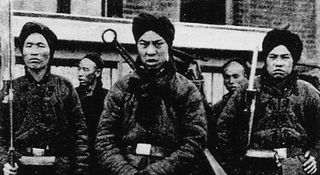
Above: To be fair, if these guys told you they could fly and deflect bullets, there's a chance you'd believe them
On the other side was the so-called Eight-Nation Alliance, a coalition of European countries (along with the US and Japan). Most of them had been exploiting the hell out of China for decades, but they had interests in the country they wanted to protect, not the least of which were their own people. (More on that in a second.)
Despite clearly being kind of nuts, the Boxers’ nationalist attitudes managed to attract a strong following throughout China, eventually earning them the semi-official approval of China’s Dowager Empress, who saw in them a chance to finally repel the foreign powers and to shore up her own popular support. In any case, the Boxers (along with a few other Chinese factions, some of them in the Imperial Army) started a campaign of anti-foreign violence that culminated with a siege on Beijing’s Legation Quarter, home to a broad assortment of foreign diplomats and soldiers.

Long story short, the Eight-Nation Alliance started attacking seaside forts in an effort to get closer to Beijing, the Chinese declared war and the Allies sent multiple invasion forces into China, eventually relieving the Legation Quarter and occupying Beijing. While not completely defeated, the Chinese nonetheless accepted conditional surrender, which called for harsh reparations (and the executions of a number of Chinese officials), but left the ruling Qing dynasty in power.
So not the best ending for China, and things didn't get much better for them in the ensuing decades. But hey, they're a major world power now, so there's that.
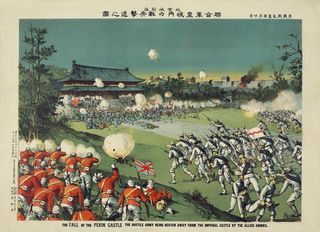
Why it’d make an awesome game: Assuming one could downplay their murderous aspects and play up their claims of badass martial-arts powers, the Righteous Harmonious Fists could make for compelling (if not precisely accurate) protagonists in a historically tinged fight against imperialist tyranny, etc., etc. Failing that, the siege of the Legation Quarter – in which a diverse group of foreigners improbably held out against Chinese attacks for 55 days – could be fascinating to explore from the defenders’ point of view.
Most Popular
